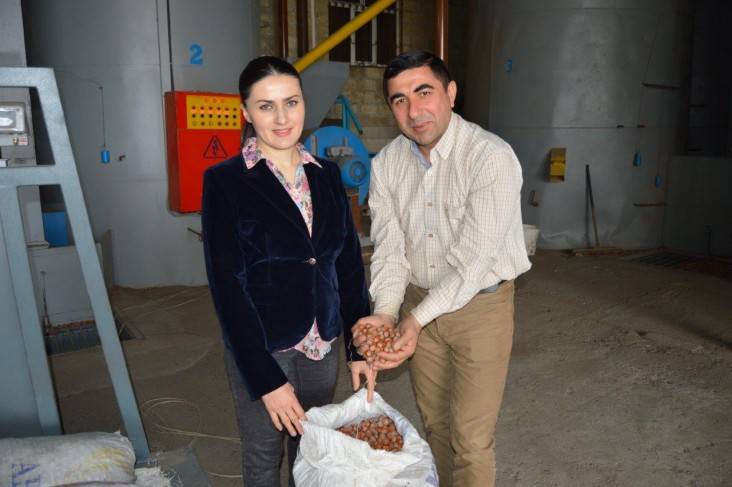
April 2017—In Azerbaijan, men make up the vast majority of agricultural entrepreneurs. And while most agribusiness managers are male, those engaged in the field and post-harvest work, which accounts for most of the jobs in the sector, are predominantly female. Fortunately, as the agricultural sector grows, new opportunities are opening up for women.
One example is a hazelnut production and processing business in northwestern Azerbaijan. The Azfem hazelnut processing plant in Zagatala is owned by Kamala Hagverdiyeva and her husband, Vugar. They also own a 2.5-hectare hazelnut orchard, established about 40 years ago in Gakh region, just south of Zagatala. The processing plant was established in 1996 and has an annual processing capacity of about 300 tons of hazelnut kernels. Over 90 percent of all processed goods are exported to the European Union and Commonwealth of Independent States countries.
Like many rural Azerbaijani women, Kamala married young (at age 21), and had never been employed or considered pursuing higher education. As the Azfem enterprise grew, she began to work as an assistant cook and janitor, and has since taken on increasing amounts of responsibility.
“Working in my husband’s operation contributed to my personal development and helped me realize that, despite a lack of management experience, I can, in fact, successfully work outside the home as well,” recounts Kamala on how her life has changed since joining the business.
Kamala was not yet a full-time employee of the business when USAID, under its Agricultural Support to Azerbaijan Project, began working with the Hagverdiyevs in 2014. USAID helped rejuvenate the orchard by introducing techniques to increase tree productivity and soil fertility, and donated equipment to target water use and help fertilizer become more efficient.
Unfortunately, poor weather last year coincided with the cyclical downturn of hazelnuts that occurs roughly every two years. USAID assistance, however, helped limit Vugar’s decrease to just 15 percent under the previous year’s yield, versus drops of 50 percent to 60 percent in neighboring orchards, while ensuring high-quality hazelnuts. Higher than average yields are expected this year.
USAID is committed to helping farmers like the Hagverdiyevs process their produce from field to final product. On the processing side, USAID provided a small grant to help Kamala and Vugar procure an automatic sorting machine. This upgrade from manual sorting will ensure that low-quality nuts do not make it into their shipments to buyers. The higher-quality product will help the company meet foreign buyer requirements, and can increase sales up to 25 percent.
Meanwhile, Kamala’s role in the business has grown. For the past two years, she’s been engaged full-time in all operations, including hazelnut procurement from other farmers, overseeing sorting, processing payroll, and serving as a quality control team member. She also takes over general management of the business when her husband is away.
“Kamala is a great help for me at work,” says Vugar. “This opportunity [to be a manager of operations] has developed her professionally and revealed some of her previously undiscovered gifts and talents.”
Kamala is one of the many women engaged in the agricultural sector in Azerbaijan who, when given a chance, are ready to unleash their potential to lead just like their male counterparts. She is serving not only as an individual success story, but as a role model for other aspiring businesswomen in agriculture.
The Agricultural Support to Azerbaijan Project, which runs from 2014 to 2018, is designed to strengthen the country's economy by improving the quality and quantity of agricultural products. Nearly 1,500 people have received agricultural productivity training, leading businesses to adopt improved practices and invest nearly $3 million of their own resources in upgrades, affecting 1,200 hectares of operations. In addition, project assistance has helped to achieve an $18 million increase in agricultural exports through improved compliance with international standards, identification of new markets, and connections with new foreign buyers.
LINKS
Follow on Facebook







Comment
Make a general inquiry or suggest an improvement.